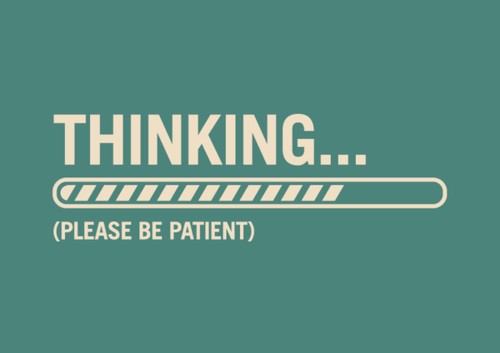Why is overthinking a problem?
Coming from a background in strategy I’m paid to ‘think’ about stuff. The only downside of this is that I’ve been trained to ‘think’ too much too often! And this often translates to me over-thinking things in my personal life. We’ve all been there….a challenge pops up and what do we do? Over-think it! Spend hours with the internal monologue chatting away as we deliberate one choice over another…..
“maybe if I did it this way…oh but what about that way! Oh how could I be so stupid it has to be this way! No wait – but then there’s that other way….oh now I’m confused!”
Sounds familiar? The problem with over-analysis is that it keeps you stuck in the problem in a loop as you go from one thought to the next to another to the next until you end up in a head-spin no closer to a solution or any kind of clarity. In fact you’re stuck in the grasp of anxiety. But is all analysis bad? Of course not! Useful analysis is required to make decisions.
How do you know if your analysis is useful? There is one simple check-point:
Analysis is ONLY useful if it brings you to an action
If you’re not drawing to any kind of conclusion or specific action point then it’s likely you are over-analysing. And over-analysis is very detrimental to your success. Someone once told me the valuable statement:
Analysis = paralysis
And for me this was an epiphany.
“What you mean all that time I’d devoted to ‘thinking’ was in actual fact providing me with zero productivity or put in another way: NO RESULTS?”
If you’re not getting a result from something then why bother doing it in the first place? This is how I feel about over-analysis. The only outcome you’re likely to get from this kind of thinking is anxiety – which I’m sure you’ll agree is not a good one.
Simple Life Strategy: how to stop over thinking
- Next time you find yourself spending a significant amount of time in analysis – ask yourself the question: Am I running over-analysis or useful analysis?
- If you are going around in circles with no outcome or action points then it’s likely you are running over-analysis
- Take a break. STOP thinking about the problem (often it’s when you stop thinking about a problem that a solution appears!)
- Return to the problem once you’ve given it a rest – but choose to only run ‘useful analysis’ and ensure you reach an action point
If you’re keen to understand exactly how to control your overanalysis using techniques created by the most successful people on the planet Contact me to find out more about my Coaching programs.
Know someone who is guilty of over thinking? Share this article with them!
Not loving your day job? Get my most popular, FREE online training here: My 3 Step process To Find A More Meaningful Career.
Join 108,000 beautiful souls on the Simple Life Strategies Facebook page to get access to articles before anyone else!




Zoe, this is amazing! I can’t believe that you have written all this. P.S. – With me in mind, it’s not really very helpful to me to say ‘stop worrying’ because it is seriously hard to turn off worries. I need strategies. My friend, Lizzie went to a monk workshop thing and he told them to write their worry down on a sheet of paper and then place it in a paper bag and hide the paper bag somewhere in the house. You are not allowed to open the bag for three week/months or whatever and then you check it. He asks “does it seem like such a worry once time passes?”
It was interesting for me to try it out. I had a bump/lump in my leg and so I totally did it and then said to myself I wasn’t allowed to worry or think about it for three weeks until I reread the note. If it was there in three weeks I would go to the doctor. Sure enough I totally forgot about it and when three weeks passed Was like, ‘Oh yeh that, who cares about that?!!” the monk also suggested this analogy: that when you are worrying about things or are panicking about something you need to remember that you have let the world or the higher being or ‘God’ know and it/he is trying to fix it for you. You are interrupting it/him by panicking or saying something along the lines of “Have you fixed it, it is finished yet, is it finished yet?” and you need to stop and let it work itself out, give it/him time to solve the problem. Does that make sense? I am placing you on a mission to come up with some new strategies to help me overcome this ‘worry’ disease I have. Thanks Bolachy. xxxxxxxxxxx
Hey Em,
Thanks for the comment! I Love the monk’s idea – it’s interesting that you said ‘you can’t tell me to just stop worrying’ when that’s pretty much what the monk did by telling you to write the worry down and NOT to ever think about it again!! Our minds are strange!
One of the strategies I use when I coach people is to break down their ‘process’ for worrying. Everything we do is a ‘process’ and there will always be a series of steps that you unconsciously take. Once you understand what those steps are, it’s simply a matter of interrupting the process to change the behaviour. (i.e. stop worrying)
We can run your ‘worry strategy’ next time I see you – or over skype if you’re keen? 😉